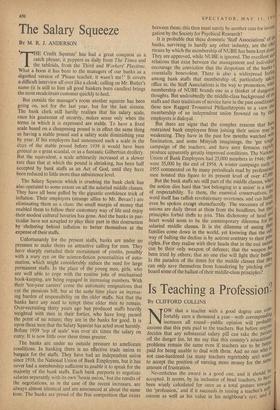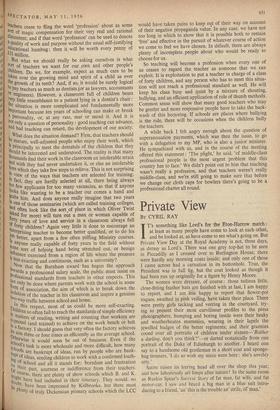Is Teaching a Profession'?
BY CLIFFORD COLLINS OW that a teacher with a good degree can CO11.1. Nfortably earn a thousand a year—with corresponding increases all round-.–public opinion will probable assume that this puts paid to the teachers. But before anY°11 decides that any substantial salary pill can take the patient off the danger list, let me say that this country's educational problems remain the same even if teachers are to be better paid for being unable to deal with them. And no one who is s not case-hardened (as many teachers regiettably are) wa,r/ tc to accept the position of earning more money for the sat" amount of frustration. Nevertheless the award is a good one, and it should b,c, accepted. It seems, by its inclusion of tread teachers, to in% been wisely calculated for once as a total gesture towaru,e, the 'profession,' and if it succeeds in raising a teacher's ac'!( esteem as well as his value in his neighbour's eye; and 1` teachers cease to fling the word 'profession' about as some ,48°,1 of magic compensation for their very real and rational discontent; and if that word 'profession' can be used to denote a quality of work and purpose without the usual self-justifying educational humbug : then it will be worth every penny of 01 million. But what we should really be asking ourselves is what sort of teachers we want for our own and other people's children. Do we. for example, expect as much care to be !Laken over the growing mind and spirit of a child as over Lae growth of its teeth? And, if so, it would be surely logical to pay teachers as much as dentists or as lawyers, accountants Or engineers). However, a classroom full of children bears very little resemblance to a patient lying in a dentist's chair : the situation is more complicated and fundamentally more leaPertant because ten years of schooling can make or break a personality, or, at any rate, mar or mend it. And it is ant only a question of personality : good teaching can advance, and bad teaching can retard, the development of our society. What does the situation demand? First, that teachers should be mature, well-adjusted people who enjoy their work, which 18, Principally to meet the demands of the children that they „suould be interested and understood. The reality is that many elcusands find their work in the classroom an intolerable strain and undertaken d wish they had never undeaken it, or else an intolerable bore which they take few steps to relieve. This is not surprising view of the ways that teachers are selected for training; ln fact, they are hardly selected at all, there being always too few applicants for too many vacancies, so that if anyone °°Ka like wanting to be a teacher out comes a hand and ,,,?raba him. And does anyone really imagine that two years L' one of those seminaries (which are called training colleges, ‘",..ri often look like the sort of place in which Oliver Twist af's4ed for more) will turn out a man or woman capable of :crti Years of love and service in a classroom always full forty children? Again- very little is done to encourage an enterprising teacher to become better qualified, or to do his lob better, apart from a few often piffling Ministry courses. 8 anyone really capable of forty years in the field without some sort of helping hand being stretched out, or benign influence exercised from a region of life where the pressure i Leas exacting and continuous, such as a university? Now ow that the Burnham award, has begun the approach .!'wards a professional salary scale, the public, must insist on 1,!rnfessional standards from teachers in other respects. This i." .an only be done where parents work with the school in some of association, the aim of which is to break down the two-way of the teacher in his classroom and inspire a genuine w ,e-way traffic between school and home. t.iin this respect, most of us could be more self-exacting. children so often fail to reach the standards of simple efficiency !natters of reading, writing and counting that workers are inPected (and trained) to achieve on the work bench or belt its a factory. I should guess that very often the factory achieves aim three or four.times as efficiently as the average school. Otherwise it would soon be out of business. Even if the school's task is more wholesale and more difficult, how many se °01s are bankrupt of ideas, run by people who are bank- rupt of ideas, sending children to work with a confirmed loath- og el school and all it stands for: boredom and frustration n their part, sourness or indifference from their teachers. of cLeurse, there are plenty of show schools which B. and K. dogn,t have had included in their itinerary. They would, no be tlet- Ple have been impressed by Kidbrooke, but there must litY of truly Dickensian primary schools which the LCC would have taken pains to keep out of their way on account of their negative propaganda value. In any case, we have not too long in which to show that it is possible both to remain 'free' and effective in the pursuit of whatever course of action we come to feel we have chosen. In default, there are always plenty of incomplete people about who would be ready to choose for us.
So teaching will become a profession when every one of us ceases to regard the teacher as someone that we can exploit. It is exploitation to put a teacher in charge of a class of forty children, and any person who has to meet this situa- tion will not reach a professional standard as well. He will keep his class busy and quiet by a mixture of shouting, bullying, and an efficient application of rule of thumb methods. Common sense will show that many good teachers who may be gentler and more responsive people have to take the back- wash of this hectoring. If schools are places where bullying is the rule, there will be occasions when the children bully the teachers.
A while back I felt angry enough about the question of superannuation payments, which was then the issue, to go with a delegation to my MP, who is also a junior minister. He sympathised with us, and in the course of the meeting offered this statement : 'The plight,' he said, 'of middle-class professional people is the most urgent problem that this country has to face.' We didn't point out to him that teaching wasn't really a profession, and that teachers weren't really middle-class, and we're still going to make sure that before we change our cloth caps for bowlers there's going to be a professional charter all round.



































 Previous page
Previous page